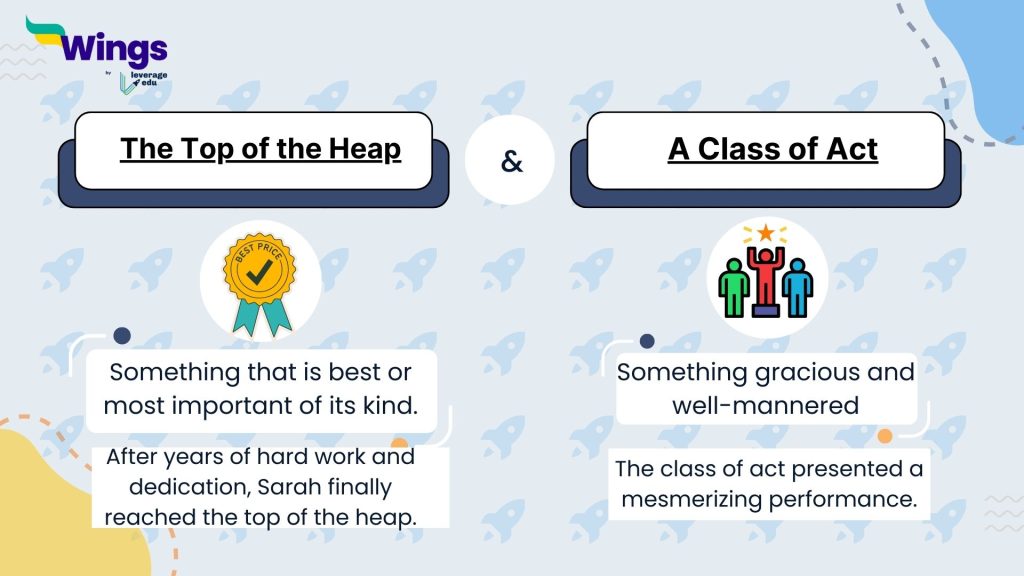Idioms for Great: Idioms are phrases or sentences that have meanings beyond the simple dictionary definitions of the words they include. Since they typically have cultural or historical significance, you could have trouble understanding them if you try to take them word for word. Instead, contexts are used to better understand their meanings. Here are some of the best idioms that convey the idea of greatness, along with their meanings and examples.
This Blog Includes:
Idioms for Great
Idioms are colourful expressions that add a unique flavour to the English language. They are phrases whose figurative meaning is different from the literal meaning of the individual words. These idiomatic expressions often draw upon vivid imagery or cultural references, making them more engaging and memorable. Let’s delve into some of these captivating idioms for Great and explore how they can enrich your communication.
The Bee’s Knees
Meaning: The idiom of the bee’s knees can be referred to as something which is excellent or outstanding.
Example: “Her performance in the play was simply the bee’s knees.”
The Cream of the Crop
Meaning: The cream of the crop is referred to as the best of a group or category.
Example: “Only the cream of the crop made it to the final round of the competition.”
Also Read: 150 Common: Difficult Idioms with Example
A Cut Above the Rest
Meaning: The idiom ‘cut above the rest’ can describe something or someone as superior or better than the others.
Example: “His culinary skills were a cut above the rest, making him the top chef in town.”
In a League of One’s Own
Meaning: Indicates being unrivalled or superior.
Example: “Her dedication to her craft put her in a league of her own among her peers.”
A Whale of a Time
Meaning: The idiom a whale of a time means to have fun and enjoy every bit of a moment.
Example: Last night at the club, we had a whale of a time.
Second to None
Meaning: The second-to-none idiom signifies that something is the best and cannot be surpassed.
Example: “The quality of their customer service is second to none in the industry.”
Here are some more idioms on great which will help you with your learning.

Stand Head and Shoulders Above
Meaning: Stand head and shoulders above idiom means being significantly better or more advanced.
Example: “Her innovative approach to problem-solving allowed her to stand head and shoulders above her colleagues.”
Also Read: Idioms for Teachers
Out of This World
Meaning: The idiom ‘out of this world’ refers to something exceptionally good or impressive.
Example: “The view from the mountaintop was out of this world.”
Have the World at One’s Feet
Meaning: The idiom ‘have the world at one’s feet’ suggests that someone has the potential for great success or influence.
Example: “After winning the championship, he seemed to have the world at his feet.”
Rise Above the Crowd
Meaning: The idiom ‘rise above the crowd’ means to surpass others and stand out.
Example: “Her ability to stay focused helped her rise above the crowd and achieve her goals.
FAQs
An idiom is a phrase that has a figurative meaning that is different from the literal meaning of the individual words.
Some of the most commonly used words for great are outstanding, notable, remarkable, exceptionally, and many more.
One way to say ‘to be the best’ with an idiom is to complement someone with “Head and shoulders above the rest signifying someone’s superiority over others.
Yes, idioms are used in various forms of English, including spoken and written. However, some idioms may be more common in certain regions or dialects.
While some idioms are suitable for formal writing, others are more informal.
It’s generally best to use idioms judiciously in formal writing.
Explore more exciting reads below:
We hope this blog provided you with great information on idioms for great. To advance your grammar knowledge and read more informative blogs, check out our Learn English page, and don’t forget to follow Leverage Edu.


 One app for all your study abroad needs
One app for all your study abroad needs












 60,000+ students trusted us with their dreams. Take the first step today!
60,000+ students trusted us with their dreams. Take the first step today!